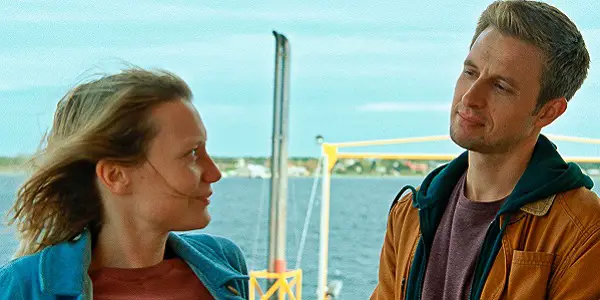NYFF 2021: BERGMAN ISLAND

Lee Jutton has directed short films starring a killer toaster,…
At the recommendation of cinematographer Sven Nykvist, Ingmar Bergman ventured to the Swedish island of Fårö more than sixty years ago to shoot the film Through a Glass Darkly, an intense drama in which a schizophrenic young woman stays on a remote island with her family and has visions of God. Through a Glass Darkly is my favorite Bergman film, due to the extraordinary subject matter and powerful performances, as well as the beautiful scenery of Fårö, so perfectly suited to the film’s story. It also marks a turning point in Bergman’s life and career, for he would go on to live on Fårö and shoot many more projects on the island, including Persona and Scenes from a Marriage, before dying there in 2007 at the age of 89.
Fårö has since become a destination for cinephiles, artists, and others seeking to pay homage to Bergman while perhaps also drawing upon some of the inspiration he found there. The latest film from writer-director Mia Hansen-Løve, Bergman Island (not to be confused with the 2004 documentary of the same name), chronicles the journey of a filmmaking couple who head to Fårö for the summer to work on their respective screenplays. As they juggle personal and professional anxieties, the lines between real life and fiction grow increasingly fuzzy, until it’s almost impossible to determine which one is inspiring which. Equal parts dreamlike and utterly real—like many of Bergman’s most memorable movies—Bergman Island manages to turn the creative process into something worth documenting itself, thanks to Hansen-Løve’s emotionally intelligent filmmaking and a lovely central performance from Vicky Krieps.
Cries and Whispers
Chris (Krieps) and Tony (Tim Roth) decide to travel to Fårö, the island made famous by one of their favorite filmmakers, for an artists’ residency in the hope that they’ll be able to focus and gain inspiration for their latest projects. They even stay in the house used in Scenes from a Marriage, despite their initial misgivings about sharing the bed from a series that “led millions to get divorced.”

It quickly becomes clear that Tony is the more prominent filmmaker of the two as well as the more prolific; he quickly bangs out a script in between giving talks to adoring fans and taking a “Bergman Safari” to some of the iconic film locations on Fårö. Meanwhile, Chris struggles to focus, staring out into the windswept grasses in between scribbles in her notebook. Instead of going on the organized “Bergman Safari,” she takes a spontaneous trip to some of the island’s less well-known locations with a university student who knows her work (Hampus Nordenson).
Eventually, as Tony starts printing out completed screenplay drafts, Chris begins to piece together the outline for a film drawing upon their time in Fårö. As she describes the plot to Tony, her film comes to life onscreen, with Mia Wasikowska starring as Amy, an American filmmaker who comes to a remote island “like this” for a wedding only to get tangled up in an old love affair. As Wasikowska and Anders Danielsen Lie act out Chris’ outline, a beautiful and sensual take on love lost, regained, and lost again, it’s all too easy to get so swallowed up by their story that one forgets that this is only the film within a film—or is it? Bergman Island glides so smoothly between these two storylines that it honestly doesn’t matter; they mesh so perfectly that it is only together that Chris’ story of creative struggle and fulfillment feels complete.
Smiles of a Summer Night
Krieps’ breakout role as Alma in Phantom Thread was that of a magnificently complicated woman, one filled with love for her husband as well as a simmering resentment that could boil over if she began to feel that she was not needed or wanted. There are shades of Alma in Chris, a talented artist hovering in the shadow of her older and more famous partner, in love with him but also frustrated with his inability to understand that her creative process is not the same as his and never will be.

Tony can sit down and force himself to write, and prefers to not talk about the process; Chris needs to explore and experience sensations and emotions and then channel those into her writing, sharing her anxieties with others along the way. It’s a very male-female dichotomy, but Hansen-Løve doesn’t hit us over the head with the gender dynamics at play, allowing the characters’ actions to speak for themselves. With Tony, one feels that the work comes before everything, including Chris; in one scene, Chris saunters into the room half-clothed and begins to unbutton her shirt, and it is only once she actually invades Tony’s personal space that he looks up from his writing to acknowledge her. Chris needs more than what Tony is willing and capable of providing, and she channels that emotional hunger into the story of Amy, a woman who falls back into bed with her ex only to discover that their dalliance doesn’t hold the same weight in his heart that it does for her.
Krieps’ open, honest face telegraphs it all, from her desire for Tony to her sheer joy at swimming in the cold waters at the remote beach she visits with Hampus to her frustration when she cannot find the house from Through a Glass Darkly (it never existed) and gets caught in the pouring rain. She and Roth have the comfortable chemistry of a couple that has been together a long time as well as the subtle tension of a couple that may be starting to realize they are not on the same page. (Needless to say, it’s impossible to watch Bergman Island and not wonder how much Chris and Tony were inspired by Hansen-Løve’s relationship with Olivier Assayas, especially with the film’s focus on the blurred lines between real life and cinema.) As for Wasikowska and Danielsen Lie, their scenes are just dynamite, with sparks flying off the screen every time their eyes meet. Their relationship has the fire Chris and Tony lack, but it is also doomed to failure, burning too bright and fast to last.

Bergman Island is stunningly photographed by experienced cinematographer Denois Lenoir, who previously collaborated with Hansen-Løve on Eden and Things to Come. Fårö is obviously naturally beautiful, but Lenoir also captures the haunted quality of the landscape that so inspired Bergman and Nykvist, including the almost too-open skies and the sea-sculpted rock pillars that dot the coastline. Nonetheless, every frame is suffused with a golden warmth that is absent from Through a Glass Darkly, Persona, and Bergman’s other black-and-white films on Fårö but is absolutely consistent with Hansen-Løve’s previous pictures. Indeed, while Bergman is a source of inspiration here, there are no attempts to mimic his style for bonus points—though there is one delightfully Persona-esque shot involving mirrors while Chris is trying on sunglasses in a shop. The soundtrack consists of several well-chosen classical tracks as well as ABBA’s “The Winner Takes All,” used in a scene featuring Wasikowska’s Amy that is an emotional high point for the movie. Throughout it all, the specter of Bergman hovers like a ghost over the proceedings, bringing characters together as well as causing conflict between them. One couldn’t really ask for a better legacy for an artist.
Conclusion
Lit from within by Vicky Krieps’ luminous performance, Bergman Island glows with passion for life, love, creativity, and yes, Bergman.
What do you think? What is your favorite Ingmar Bergman movie? Share your thoughts in the comments below.
Bergman Island is screening as part of the Main Slate at the New York Film Festival and is released in the U.S. on October 15, 2021. You can find more international release dates here.
Does content like this matter to you?
Become a Member and support film journalism. Unlock access to all of Film Inquiry`s great articles. Join a community of like-minded readers who are passionate about cinema - get access to our private members Network, give back to independent filmmakers, and more.
Lee Jutton has directed short films starring a killer toaster, a killer Christmas tree, and a not-killer leopard. Her writing has appeared in publications such as Film School Rejects, Bitch: A Feminist Response to Pop Culture, Bitch Flicks, TV Fanatic, and Just Press Play. When not watching, making, or writing about films, she can usually be found on Twitter obsessing over soccer, BTS, and her cat.













